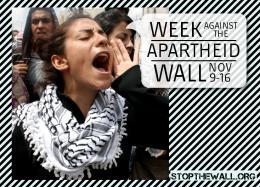Tag: Stop The Wall
-
Global week of action against Israel’s wall in the West Bank
by Nora Barrows-Friedman 9 November 2011 | The Electronic Intifada Since the beginning stages of Israel’s implementation and continued construction of its illegal wall in the occupied West Bank nearly ten years ago — and compounded with the International Court of Justice’s (ICJ) ruling in 2004 that the wall is in violation of several international…
-
The global intifada
16 October 2011 | Palestinian Grassroots Anti-Apartheid Wall Campaign, Jamal Juma Palestine is an international symbol of struggle against occupation, racism, and colonialism. On October 15, 2011 the world gathers in what some have called a global intifada, to stand up against imperialism. The first time an international activist came up to me and sincerely…
-
Winning films announced for the first International Israeli Apartheid Short Film Contest
08 February 2011 | Stop the Wall & itisapartheid.org A year ago, Stop the Wall and itisapartheid.org began to collaborate on the first International Israeli Apartheid Short Film Contest. This contest encouraged the local Palestinian and larger international community to submit short films on the theme of Israeli Apartheid. From the videos submitted, the top…

